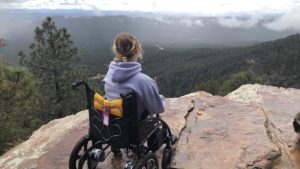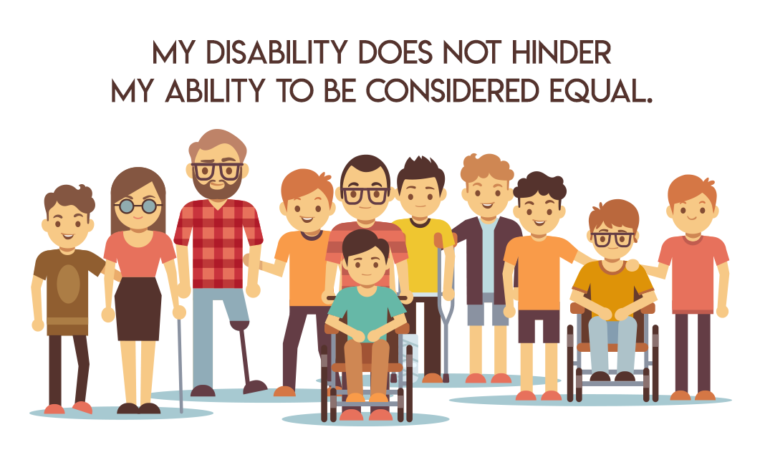Written by Carly Verbeke:
I have become so good at existing without a functional wheelchair—which is otherwise a vital part of my everyday life as a person with a disability—that I should be able to include it as a skill on my resume. Growing up as a wheelchair user, I learned rather quickly that most wheelchairs that I was eligible to have covered under insurance weren’t approved to be used outdoors. Foldable power wheelchair models like the ones that I use are usually purchased because they can be folded for storage, for transport in a car or trunk, or for transport on a train or airplane. I won’t lie: this is exactly the reason why I prefer to use them, other than the fact that my insurance covers them for me. I’m a very active person, always traveling in some way or another, and I’m also outside every chance I get. Hiking is my favorite pastime, but it’s also how the majority of my wheelchairs break. The small-wheels-in-front design enhances maneuverability indoors, in small apartments and tight quarters. However, they are potentially dangerous outdoors because of uneven and cracked riding surfaces.
 The last hike that I went on before going back to Michigan for the holidays had an incline so steep that my entire wheelchair veered to the left, permanently preventing my wheelchair from turning to the left after that. In the week following the hike, the left front wheel of my chair had fallen off entirely. Unfortunately for me, the wheelchair I used on the hike was my “backup wheelchair” since the one I use normally was being repaired. Luckily for me, Amazon has literally everything. I also live in an apartment complex with the world’s greatest front office assistants, who offered to help me put the wheelchair together after it was delivered. In the middle of this process, one of the office assistants who was kind enough to help me stopped and said, “Forgive me for saying this, but I haven’t had a lot of exposure to the disabled community and I’m always unsure of how to treat them. Do you have any advice?”
The last hike that I went on before going back to Michigan for the holidays had an incline so steep that my entire wheelchair veered to the left, permanently preventing my wheelchair from turning to the left after that. In the week following the hike, the left front wheel of my chair had fallen off entirely. Unfortunately for me, the wheelchair I used on the hike was my “backup wheelchair” since the one I use normally was being repaired. Luckily for me, Amazon has literally everything. I also live in an apartment complex with the world’s greatest front office assistants, who offered to help me put the wheelchair together after it was delivered. In the middle of this process, one of the office assistants who was kind enough to help me stopped and said, “Forgive me for saying this, but I haven’t had a lot of exposure to the disabled community and I’m always unsure of how to treat them. Do you have any advice?”
In any other situation, I would have been really confused or even hurt by this question, but he was so polite about it that I could see he just wanted not to offend anyone. So I said, “Treat us like humans. It’s that simple. If you see us with an able-bodied person, please still acknowledge us. If you have a question for us, please ask us directly. Also, please, I’m begging you, use a normal tone of voice when speaking to us instead of one in the same octave that you would use when addressing a dog.” He kind of laughed at that, as did I, but the thought was entirely serious.
I can’t speak on behalf of every single person with a disability, but I can almost guarantee you that even if they are unable to answer your questions or engage in conversation with you themselves, they’ll be thankful that you acknowledged them as a human being instead of talking over their head or avoiding them like the plague.
Disabled people are people, too.

 The last hike that I went on before going back to Michigan for the holidays had an incline so steep that my entire wheelchair veered to the left, permanently preventing my wheelchair from turning to the left after that. In the week following the hike, the left front wheel of my chair had fallen off entirely. Unfortunately for me, the wheelchair I used on the hike was my “backup wheelchair” since the one I use normally was being repaired. Luckily for me, Amazon has literally everything. I also live in an apartment complex with the world’s greatest front office assistants, who offered to help me put the wheelchair together after it was delivered. In the middle of this process, one of the office assistants who was kind enough to help me stopped and said, “Forgive me for saying this, but I haven’t had a lot of exposure to the disabled community and I’m always unsure of how to treat them. Do you have any advice?”
The last hike that I went on before going back to Michigan for the holidays had an incline so steep that my entire wheelchair veered to the left, permanently preventing my wheelchair from turning to the left after that. In the week following the hike, the left front wheel of my chair had fallen off entirely. Unfortunately for me, the wheelchair I used on the hike was my “backup wheelchair” since the one I use normally was being repaired. Luckily for me, Amazon has literally everything. I also live in an apartment complex with the world’s greatest front office assistants, who offered to help me put the wheelchair together after it was delivered. In the middle of this process, one of the office assistants who was kind enough to help me stopped and said, “Forgive me for saying this, but I haven’t had a lot of exposure to the disabled community and I’m always unsure of how to treat them. Do you have any advice?”